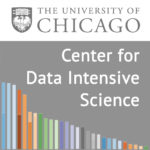Data Science Educational Outreach
Center for Data Intensive Science

Mentors
Sara Volk de Garcia, Ph.D., Scientific Support Analyst, Center for Translational Data Science
Dan Biber, M.S., Senior Scientific Support Analyst, Center for Translational Data Science
About Us
The Center for Translational Data Science (CTDS) is pioneering translational data science to advance biology, medicine, healthcare, and the environment. We’re a dedicated team of researchers and engineers drawing from different backgrounds and ideas to push the boundaries of translational data science. We work closely with academic, government and industry researchers in various fields of the biological sciences. We develop and operate large-scale, open-source data commons, including the MIDRC Data Commons, Pandemic Response Commons, and the NCI Genomic Data Commons (GDC), and data meshes like the HEAL Platform and the Biomedical Research Hub. These computational platforms support hundreds of users in the scientific research community across the world with varying technical skills, backgrounds, and research objectives.
Internship Background
Biomedical Research Hub (BRH; https://brh.data-commons.org/) is a Gen3 Data Mesh that aggregates and hosts metadata from multiple data commons resources to make biomedical research data discovery and access easy for users. Some examples of the breadth of data types and research available in the data mesh can be seen in the example analyses here: https://brh.data-commons.org/resource-browser. BRH is designed to serve users with a variety of objectives, backgrounds, and specialties. We are interested in broadening participation to include more high-school teachers and primarily-undergrad professors such that these educators can use BRH to build authentic and engaging research experiences for their students.
Internship Description
The intern(s) will act as an Educational Outreach Intern, engaging with the BRH team and the user services team to prepare documentation and/or other resources to make the Biomedical Research Hub and its workspace more accessible to high-school teachers and primarily-undergrad professors. Some examples of deliverables include Jupyter notebooks, presentation slide decks, user guides, and/or videos. Intern(s) will be expected to: (1) learn how to use BRH tools; (2) be able to identify what skills and background knowledge were necessary for them to do analysis with BRH tools; and (3) translate their experience to create user resources (tutorials, documentation, videos, etc) targeting educators who are not research professionals. The specific form of resources created may depend on interns’ skills and interests. Work will be performed in a fast-paced, entrepreneurial-like setting where intern(s) will have hands-on opportunities to learn and implement best practices of the Agile software development approach and use the JIRA issue tracking system.
Learning Objectives
There is room for customization of tasks to fit the skills and interests of intern(s). Opportunities include training for any of these:
- Use and operate the Biomedical Research Hub, a Gen3 Data Mesh.
- Interact with our BRH’s APIs via Python.
- Write documentation in the Markdown language with MkDocs software and publish it online with GitHub Pages.
- Create software demonstrations and user tutorials by developing Jupyter Notebooks in the Python or R programming languages.
- Script presentations for an educator audience.
- Examine educational grant opportunities for key language to guide our resource development (making our users more competitive for these grants).
- Collaborate with other CTDS team members using the “Git” version-control system.
- Receive hands-on experience with the JIRA task management software.
Qualifications
- Strong interest in data science and educational outreach is required.
- Eagerness to learn new skills and tools is required.
- Creativity, curiosity, empathy, and observational skills are required.
- Openness to receiving constructive feedback on assignments is required.
- Experience with curriculum development or high–school/undergrad education and research experiences is a plus.
- Experience with Git version–control system is a plus.
- Experience with Python or R is a plus.
Your application must include a current CV and a cover letter describing why this internship is relevant to your career goals.
